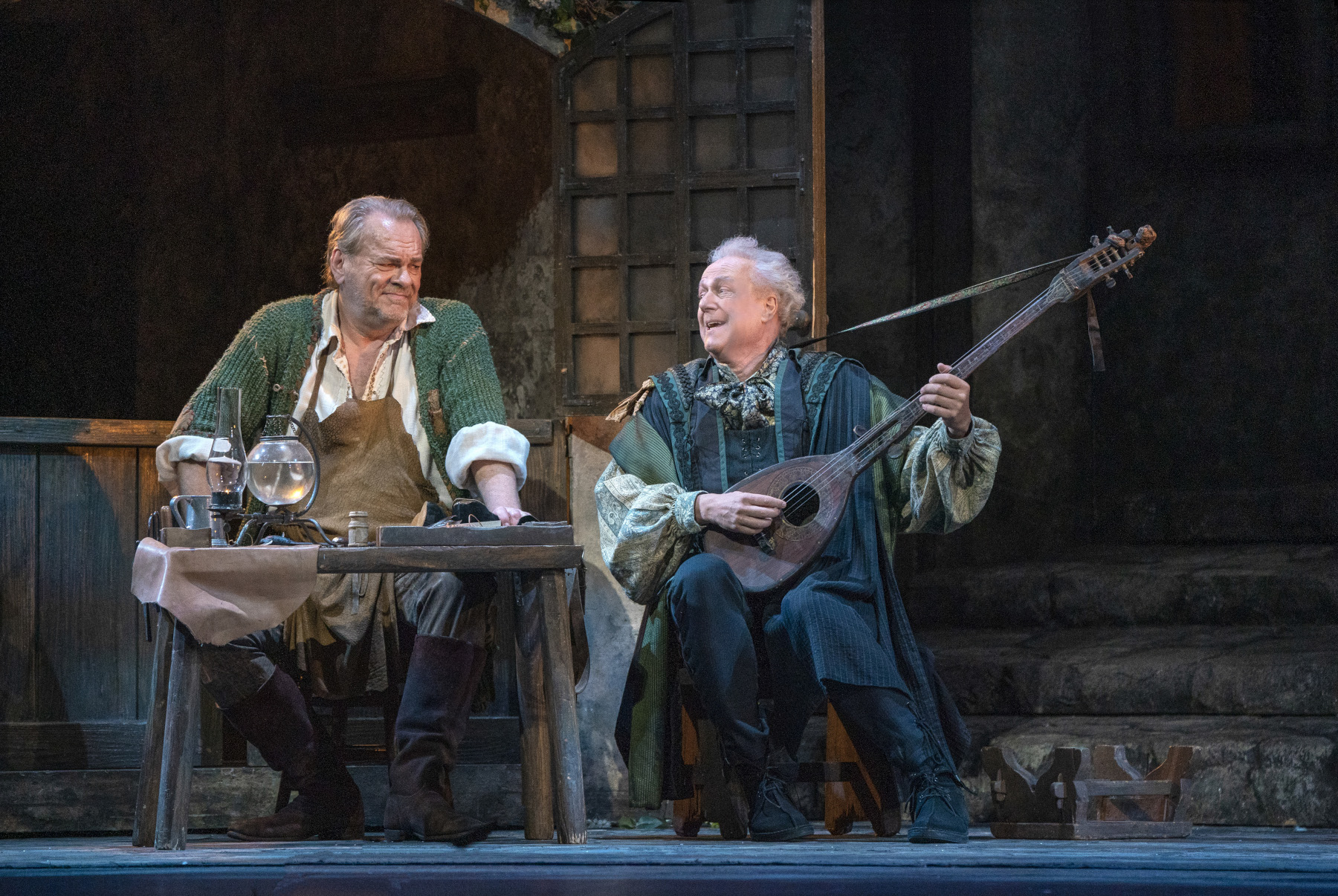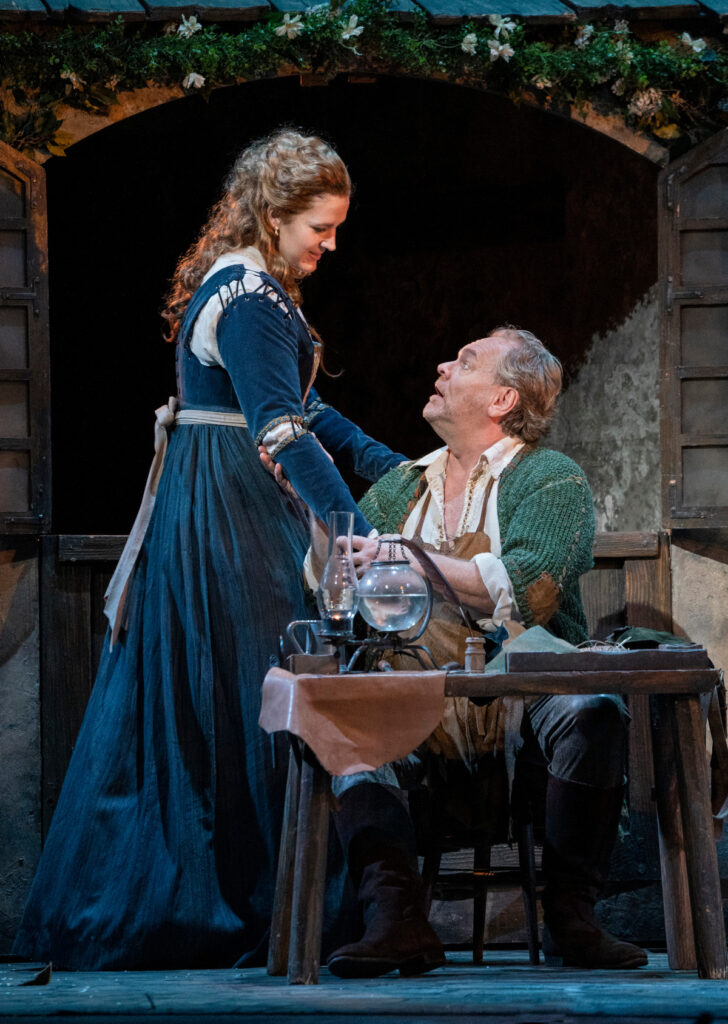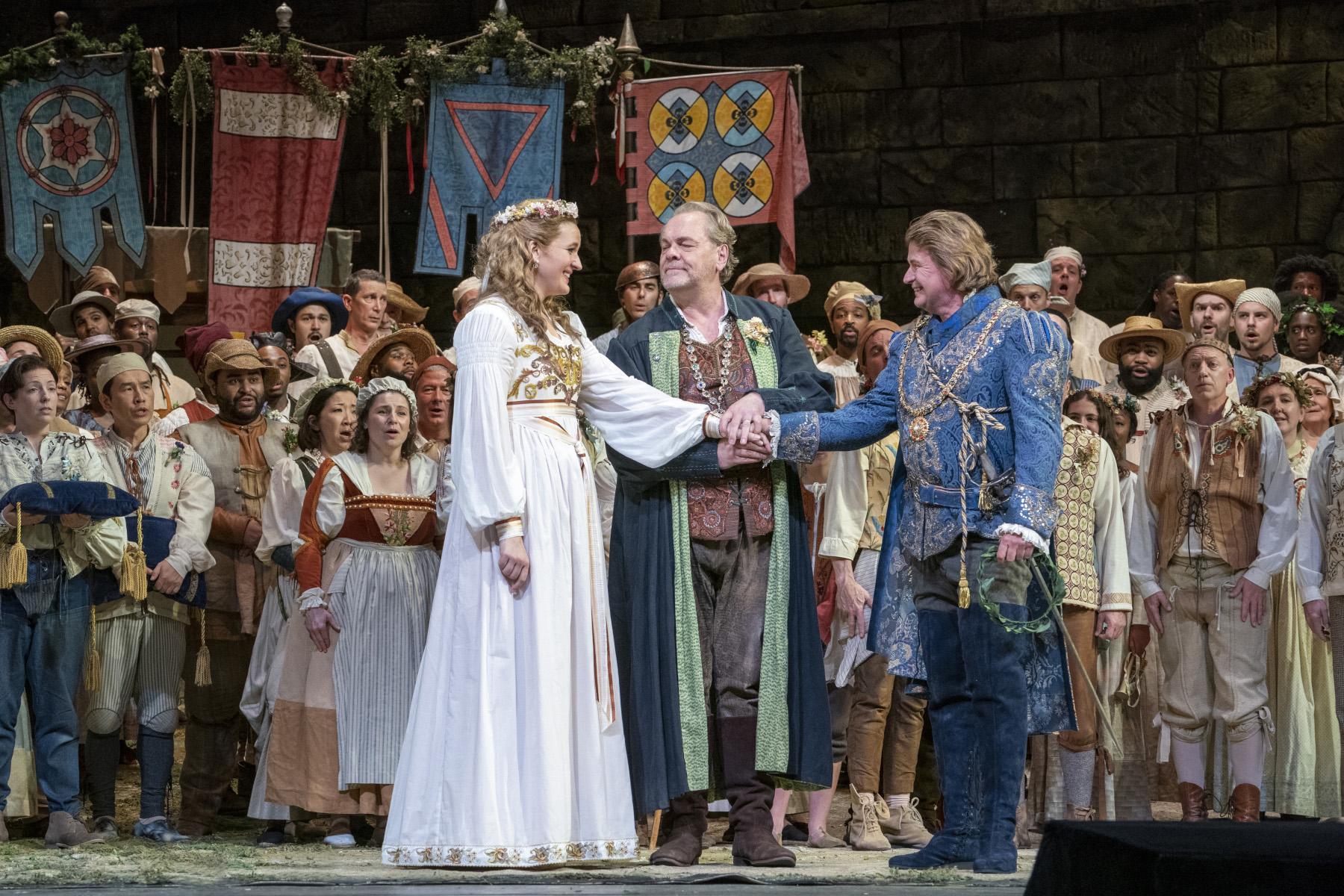Last week I attended the recent MET revival of Richard Wagner’s Die Meistersinger von Nürnberg alone. My wife declined to join me, insisting that she could not bear hearing endless lectures by Wagner, the real-world Meister of Bayreuth, filtered through Hans Sachs, the fictional Meister of Nürnberg. A regular opera buddy (professional musician of unquestioned taste) rebuffed me with a brief text message: “Wild horses couldn’t drag me to that ghastly piece.”
They have a point: Die Meistersinger is an acquired taste, even among Wagnerians. For those who suffer back pain or seek just seek a relaxing night out, its six-hour span is a deal-breaker. To those attracted by Wagner’s eroticism, anarchism, spiritualism or romanticism, a comedy about bourgeois marriage set among pompous members of medieval Nürnberg guilds offers little. To those enticed by Wagner’s daring chromaticism, its diatonic harmonies seem tame. And to those who associate Wagner with Nazism, the opera seems politically suspect.

Nonetheless, I went. Not insignificant in my decision was a conviction that the MET’s stringently enforced vaccination-only rules – and the sea of unsold seats around me on a Thursday night – would reduce epidemiological risk to an acceptable level. And, though I had not foreseen it, those who came and stayed were true opera lovers – no coughing, fidgeting or bolting for the exits before the applause runs its course. A significant minority read the subtitles in German. And what a pleasure to walk through the foyer overhearing snippets of informed conversation comparing this performance to the dress rehearsal, previous nights in the same run, or to memorable performances in recent decades.
For me, the main attraction was the cast and conductor. Most of the singers were veterans of recent Bayreuth and Salzburg productions of this opera, or the previous run at the Met in 2014 – and they were performing under one of the world’s finest opera conductors.
In the smaller halls of Germany, the result might have been transcendent. In this hall, it was very satisfying. One could not help noting that, as is so often true these days, that the singers pushed a bit, sometimes sacrificing warm timbre, even tone and clear diction to make themselves heard – or, in the case of the soprano singing Eva, to keep her voice down.
German bass-baritone Michael Volle sang the central role of Hans Sachs. While his performance did nothing to erase memories of warmer and weightier predecessors at the Met, Volle sang a baritonal Sachs of subtlety and taste. He cleverly husbanded his resources in the first two acts to make a maximal impression in the third.

At first hearing, tenor Klaus Florian Vogt’s clear, cool, precise and oddly metallic vocal timbre marks him as miscast: he would be more suited to the role of David than that of Walter von Stolzing. And yet, in this and other roles, he makes a credible, if not entirely compelling, Wagnerian hero, rising effectively to Walter’s musical high points later in the opera and slotting his distinctive voice surprisingly well into ensembles.
Eva was portrayed by 34-year old Norwegian Lise Davidsen, the great hope among young Wagnerian sopranos. When she cut loose in higher passages – as she did, inappropriately if impressively, at times in Act III – the voice reverberated around the hall in a way no one has heard for a generation. Most Wagnerians do not mature before their late 30s, yet already now she can still fit only awkwardly into the role of Eva, which requires an easy sweetness and warmth and a command of fine detail that she is losing. Whether, in compensation, she will develop the low notes and weight required of a great Brünnhilde remains to be seen.
Note for note, perhaps the most satisfying performance was the velvety-toned, impeccably enunciated and clearly characterized Pogner of bass Georg Zeppenfeld. Similarly unglamorous yet equally satisfying both vocally and dramatically were the David of Paul Appelby and the Beckmesser of Johannes Martin Kränzle – both reprised from the Met’s last run in 2014.
Antonio Pappano (Music Director of the Royal Opera at Covent Garden, London) has been strangely absent from the MET for nearly a quarter century, though his early career was in New York. His was a commanding conception of this opera, superbly paced at a slightly faster tempo and with tauter rhythmic drive than that of the late James Levine. Reported inconsistencies earlier in the run had disappeared. Subtle orchestral balances and subtle intimacy in certain moments compensated for a bright orchestral tone in grander passages that occasionally shortchanged the mellow nostalgia one associates with this score.

The performance I attended last Thursday was the 42nd over nearly thirty years to use the grand old Otto Schenk/Günther Schneider-Siemssen production. This one has quietly survived while the MET management replaced the same team’s beloved Ring cycle and similarly photo-realistic productions by Franco Zeffirelli – almost invariably with disastrous consequences.
This old production recreates evoke medieval Nürnberg with almost cinematic realism – a clear reimagining of Wagner’s own sets for the work’s 1868 München premiere. Best of all, despite its grandeur, the production seems natural, often even intimate, in a homey way. (Bavarians might call it gemütlich.) It lacks any of the tendentious irony that has cluttered almost every major new production of this opera since 1993.
In the MET production, even Sachs’ final monologue – notorious for a few lines warning of foreign dangers to Germany, reportedly inserted by Wagner’s wife Cosima – appeared benign. It seemed to express, as Wagner surely intended, not proto-Fascist political chauvinism – a sentiment utterly foreign to Wagner – but the utopian aspiration that a great artistic tradition (in this case, “die heilige deutsche Kunst”) could bring a whole community together, surmounting rather than reinforcing the false divisions of social class or political power. Far from an invitation to powerful nationalist leaders, it is an eternal reminder of their ultimate insignificance.
Yet, even as he finished the opera, Wagner surely grasped that industrialization and nationalism were irrevocably transforming his conception of an organic cultural community (let alone one based on craft production) into a utopian fantasy. (A decade later, in Parsifal, he would turn instead to otherworldly Buddhism for the final answer.) But before he lost faith in the political utopianism he had espoused since his 20s, he left us Die Meistersinger von Nürnberg as a timeless reminder of what could perhaps have been. What better work to inspire a return to live opera in New York after two years of enforced seclusion?
Andrew Moravcsik
Die Meistersinger von Nürnberg
Music and libretto by Richard Wagner
Cast and production team:
Hans Sachs: Michael Volle; Eva: Lise Davidsen; Walther von Stolzing: Klaus Florian Vogt; Magdalene: Claudia Mahnke; David: Paul Appleby; Beckmesser: Johannes Martin Kränzle; Pogner: Georg Zeppenfeld; Kothner: Martin Gantner; Vogelgesang: Miles Mykkanen; Nachtigall: Mark Delavan; Ortel: Bradley Garvin; Zorn: Chaz’men Williams-Ali; Moser: Robert Watson; Eisslinger: Scott Scully; Foltz: Richard Bernstein; Schwarz: Scott Conner; Night Watchman: Alexander Tsymbalyuk.
Conductor: Antonio Pappano.
Production: Otto Schenk; Set Designer: Günther Schneider-Siemssen; Costume Designer: Rolf Langenfass; Lighting Designer: Gil Wechsler; Stage Director: Paula Suozzi; Choreography: Carmen De Lavallade.
Metropolitan Opera House. November 11, 2021.
Above: Klaus Florian Vogt as Walther
All photos Richard Termine/Met Opera